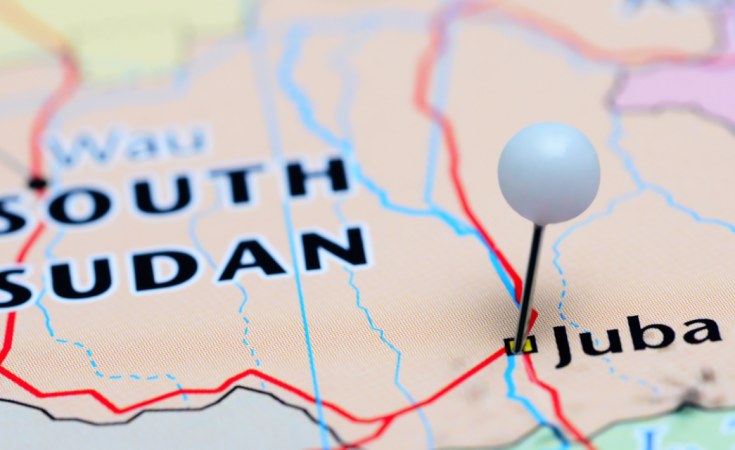Juba — Médecins Sans Frontières (MSF) teams are recording a concerning rise in measles and malnutrition cases in our facilities in South Sudan, particularly amongst returnees fleeing conflict in Sudan and host communities.
Our medical facilities in Upper Nile, Unity, Northern Bahr El Ghazal and Warrap states are receiving patients, especially children below five years old, suffering from measles and other critical conditions.
As more returnees arrive at border locations, we call on donors and humanitarian actors to urgently improve the surveillance system and scale up the response from the points of entry to the places of resettlement, to ensure dignified conditions for the displaced people and host communities.
"Measles and nutritional responses must be reinforced immediately. Screening and catch-up vaccination at points of entry must be extended to 24/7," says Mohammad Ibrahim, MSF head of mission in South Sudan.
"Equally, mobile vaccination teams must be deployed in transit, reception sites and within host communities to ensure continuous screening and catch-up vaccination for new arrivals that have been missed at the border. Community surveillance must be strengthened to prevent the further spread of measles," says Ibrahim.
Since the eruption of conflict, over 200,000 people have been registered crossing to South Sudan as of first week of August. Over 90 per cent of them are South Sudanese, arriving exhausted and extremely vulnerable.
These people, mostly women and children, are either spread across the country struggling to integrate themselves into communities, or at transit centres close to the border; in both cases requiring essential services such as healthcare, access to clean water and sanitation infrastructure, food and non-food items, protection, and shelter.
"We want three things to survive. The first one is food. The second one is plastic sheets to have a shelter. And thirdly, we need medication." says Nyakiire Nen, whose two-year-old daughter is receiving treatment for measles at the MSF hospital in Bentiu camp
Tweet this
"We are in a terrible situation. There is no food. We are living under the trees," says Nyakiire Nen, whose two-year-old daughter is receiving treatment for measles at the MSF hospital in Bentiu camp in Unity state.
"We want three things to survive. The first one is food. The second one is plastic sheets to have a shelter. And thirdly, we need medication."
MSF response
In view of the alarming influx of measles patients in Renk and Bentiu, our teams have set up dedicated isolation wards, while the capacity of MSF facilities have been expanded to treat more patients in Aweil, Leer and Malakal.
In Twic County, we supported the establishment and equipment of a 25-bed measles isolation centre at Mayen Abun Hospital, while supporting the training of frontline healthcare workers on case definition, identification and management of measles in eight general healthcare centres across the County.
In Upper Nile state, Renk is the busiest entry point to South Sudan for those escaping the conflict, many originating from White Nile state, Sudan, where in the past month, our teams have identified over 1,300 suspected measles cases. Since 20 June 2023, the isolation ward set up by MSF in Renk County hospital has received 317 patients, more than 75 per cent being returnees.
Children are the most affected, with more than 80 per cent of patients being children under four years old. Less than 15 per cent of them have been vaccinated against measles. As these returnees are living together in congested transit centres and travelling in large numbers on crowded trucks or boats, the spread of the disease is enormous.
In Paloich, we launched a three-week emergency intervention on 27 July 2023, focusing on addressing the health and nutrition needs of over 3,000 people residing in the returnees' camp.
"My children were healthy when we were in Khartoum. But on the way, they started having diarrhoea and becoming weak," says Martha Nyariek about her one-year-old daughter, Nyageng Mawich, and three-year-old son Bol Mawich.
"We were drinking river water in Malakal, and the colour of it was almost red. When we were moving with the boat from Malakal to Bentiu, the children started having symptoms of measles," she says.
To prevent measles from taking more lives, there is an urgent need to scale up food support and to conduct catch-up vaccinations to immunise everyone. Dr Ran Jalkuol, MSF medical doctor
In Malakal, the humanitarian situation for returnees in Bulukat transit camp remains dire and exacerbated by lack of food and transport to their final destination. They come in large numbers with many sick people, particularly children. A constant increase of malnutrition cases is being recorded in our facilities.
We have started a mobile clinic in the transit camp, while the MSF hospital - the only specialised healthcare facility for children - is working beyond its bed capacity. Similarly, the MSF hospital in Aweil has witnessed a 65 per cent increase in malnutrition cases in the first six months of 2023, compared to the same period last year.
"If a child is malnourished, it is easier to be infected by measles and there is a higher risk of death," says Dr Ran Jalkuol, MSF medical doctor.
"Most of our patients are children who are unvaccinated. To prevent measles from taking more lives, there is an urgent need to scale up food support and to conduct catch-up vaccinations to immunise everyone, especially returnees of age six months and above. Children between six months and four years old are the most vulnerable."
South Sudan is already prone to regular measles outbreaks. In 2022, two measles outbreaks were declared by South Sudan's health authorities, with the latter affecting all the states and administrative areas. The influx of returnees and growing cases of measles among displaced people and host communities is another burden on a healthcare system that is already inadequate to meet the needs.


